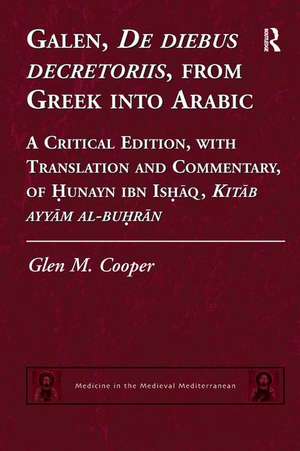Galen, De diebus decretoriis, from Greek into Arabic: A Critical Edition, with Translation and Commentary, of Hunayn ibn Ishaq, Kitab ayyam al-buhran: Medicine in the Medieval Mediterranean
Autor Glen M. Cooperen Limba Engleză Paperback – 9 sep 2016
| Toate formatele și edițiile | Preț | Express |
|---|---|---|
| Paperback (1) | 464.79 lei 6-8 săpt. | |
| Taylor & Francis – 9 sep 2016 | 464.79 lei 6-8 săpt. | |
| Hardback (1) | 1318.84 lei 6-8 săpt. | |
| Taylor & Francis – 28 aug 2011 | 1318.84 lei 6-8 săpt. |
Preț: 464.79 lei
Preț vechi: 489.26 lei
-5% Nou
Puncte Express: 697
Preț estimativ în valută:
88.97€ • 96.67$ • 74.78£
88.97€ • 96.67$ • 74.78£
Carte tipărită la comandă
Livrare economică 21 aprilie-05 mai
Preluare comenzi: 021 569.72.76
Specificații
ISBN-13: 9781138250833
ISBN-10: 113825083X
Pagini: 640
Dimensiuni: 156 x 234 x 33 mm
Greutate: 0.45 kg
Ediția:1
Editura: Taylor & Francis
Colecția Routledge
Seria Medicine in the Medieval Mediterranean
Locul publicării:Oxford, United Kingdom
ISBN-10: 113825083X
Pagini: 640
Dimensiuni: 156 x 234 x 33 mm
Greutate: 0.45 kg
Ediția:1
Editura: Taylor & Francis
Colecția Routledge
Seria Medicine in the Medieval Mediterranean
Locul publicării:Oxford, United Kingdom
Cuprins
Contents: Foreword; Transliteration conventions; The scope of the present study; Part I Historical Background: Introduction; The Critical Days in Arabic; An historical reconstruction; The sciences in the Critical Days; Sources of the edition. Part II Edition and Translation of the De diebus decretoriis; Signs and conventions employed in the Apparatus Criticus; The Critical Days: Arabic edition: Book I; Book II; Book III; English translation: Book I; Book II; Book III. Part III Commentary: Preface to commentary; Referencing the main text; Book I; Book II; Book III. Part IV Appendices; Bibliography; Indices.
Notă biografică
Glen M. Cooper is Assistant Professor, Department of History, Brigham Young University, USA
Recenzii
'... great service that Cooper has done all those interested in Graeco-Arabic studies and the history of medicine by making this Arabic version available and accessible. For this, he deserves our thanks.' Journal of Islamic Studies 'Cooper’s book is an important contribution to the history of science.' Aestimatio
Descriere
This book presents the first edition, translation, and study of Hunayn ibn Ishaq's Arabic translation of the Galenic treatise De diebus decretoriis (kitab ayyam al-buhran 'Concerning the Critical Days'). It makes available this key text on prognosis in medicine, and at the same time throws new light on the activities of perhaps the most important translator in 9th-century Baghdad.









